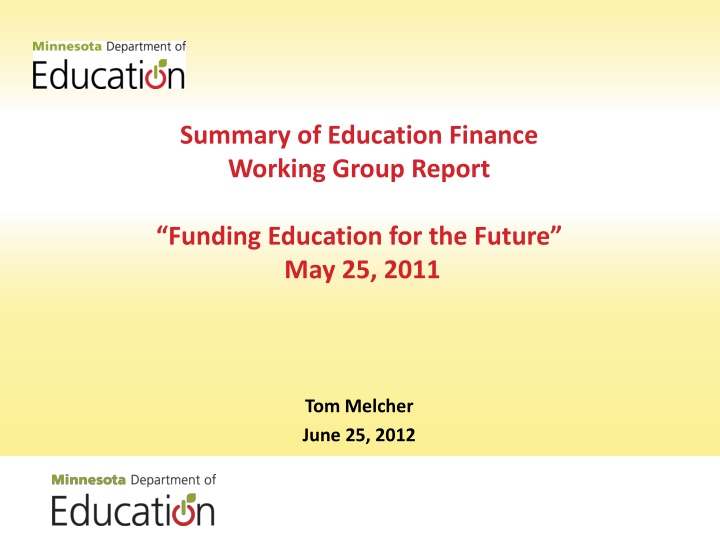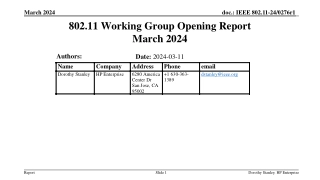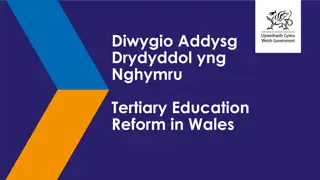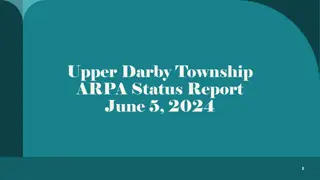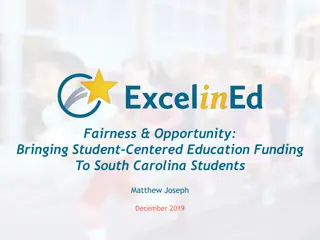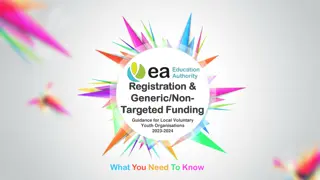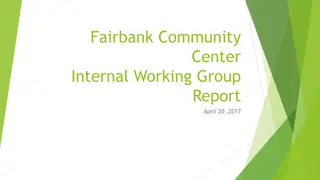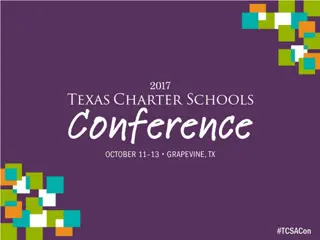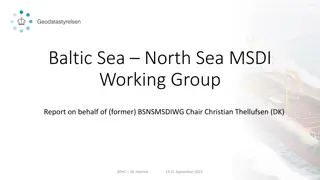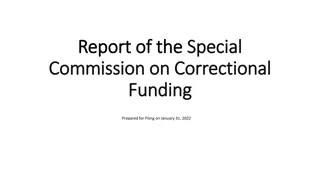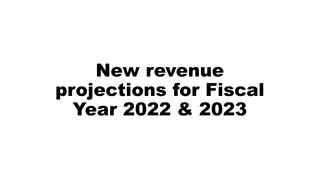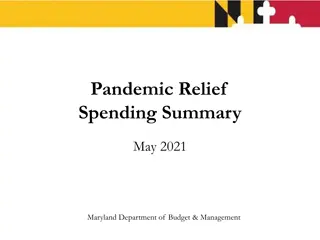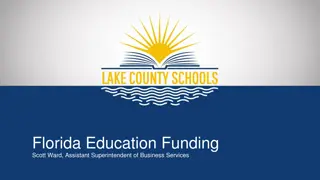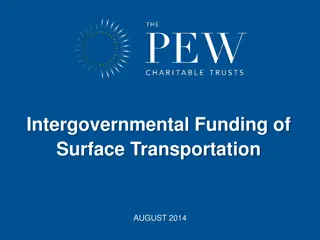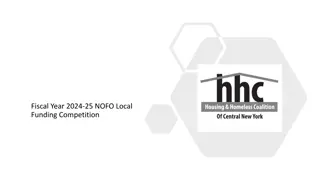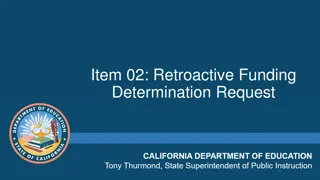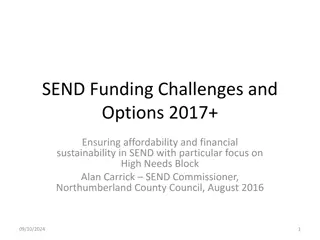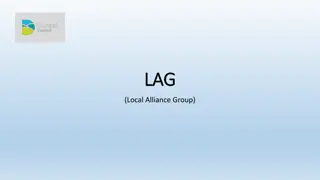Funding Education for the Future - Working Group Report Summary
This report summarizes the findings and recommendations of the Education Finance Working Group regarding school finance reform to enhance education funding. The group aimed to address adequacy, equity, stability, and local control in pre-K-12 education funding, aiming to close the achievement gap and promote high achievement for all students. The report outlines the goals, assumptions, and limitations guiding the reform efforts to ensure effective allocation of state funding for education.
Download Presentation

Please find below an Image/Link to download the presentation.
The content on the website is provided AS IS for your information and personal use only. It may not be sold, licensed, or shared on other websites without obtaining consent from the author.If you encounter any issues during the download, it is possible that the publisher has removed the file from their server.
You are allowed to download the files provided on this website for personal or commercial use, subject to the condition that they are used lawfully. All files are the property of their respective owners.
The content on the website is provided AS IS for your information and personal use only. It may not be sold, licensed, or shared on other websites without obtaining consent from the author.
E N D
Presentation Transcript
Summary of Education Finance Working Group Report Funding Education for the Future May 25, 2011 Tom Melcher June 25, 2012
Working Group Membership and Timelines (Spring 2011) 23 Members, including: 4 business managers 5 superintendents and 1 retired superintendent 2 school board members and executive director of MSBA 2 special education directors 2 teachers union presidents Parent advocate Charter School director Principal and Executive Director of MASSP 5 Ex Officio Legislative Members Chaired by Tom Nelson (Stillwater Supt) and Peggy Ingison (Minneapolis CFO) Meetings: March 30, April 6, April 20, May 4, May 11, May 25 2
Charge to the Committee Develop recommendations for school finance reform to present to the Governor. The intent was to provide information to inform policy discussions as the 2011 legislative session came to a close, and for development of Governor s budget recommendations to the 2012 and 2013 legislatures. As a starting point for discussion, the working group was asked to review draft funding reform proposals developed by MDE. 3
Goals 1. Improve the adequacy, equity, and stability of pre K-12 education funding. 2. Simplify education funding. 3. Preserve local control. 4. Close the achievement gap. 5. Promote high achievement for all students. 6. Direct resources closest to students, teachers and the classroom. 4
Assumptions Limiting Scope of Work 1. The state s $5.0 billion budget shortfall for the FY 2012 - 2013 biennium, and the projected shortfall of $4.4 billion for the FY 2014 - 2015 biennium, will preclude large increases in E-12 education funding in the near future. 2. Despite the state s gloomy budget outlook, state policymakers and the public put a high priority on E-12 education. 3. Given the above, it is assumed for purposes of this working group that E-12 funding will not be reduced in the near future, but will increase by a modest amount. 4. Therefore, the working group should focus on identifying and developing options that will most effectively advance the education funding reform goals outlined above, given a modest influx of new state funding ($20 - $200 million range). 5
Assumptions Limiting Scope of Work 5. Changes in state taxes (e.g., Income, Sales) were not part of the charge to the working group. 6. It was further assumed that there will not be an increase in state total property tax levies for E-12 education, and that any proposed changes in property taxes will not create significant redistribution of property tax burdens among districts or regions 6
WORKING GROUP RECOMMENDATIONS (See Executive Summary, Pages 1 & 2) 1. Invest in early learning, with resources targeted first to all-day kindergarten for students living in poverty. Beginning in FY 2013, provide all-day K funding for students eligible for free or reduced-price lunches who participate in a free all-day K program open to all kindergarteners at their school. Fund classroom observation of teachers and feedback as part of a proposed statewide early childhood quality rating and improvement system (QRIS). 7
WORKING GROUP RECOMMENDATIONS 2. Roll a portion ($400) of referendum levies into the general education formula Provide a more adequate, uniform and stable funding base for all districts and charter schools. Lessen reliance on local referenda. 8
WORKING GROUP RECOMMENDATIONS 3. Establish a uniform general education levy by consolidating and replacing existing school levies, including a portion of existing referendum levies rolled into the formula. There will be no increase in total school levies with a component of the levy spread on tax capacity and a component spread on referendum market value. 9
WORKING GROUP RECOMMENDATIONS 4. Simplify funding formulas and student accounting to make E-12 education funding more understandable and transparent. Simplify student weightings Separate declining enrollment funding from pupil weighting system Eliminate obsolete / inequitable funding categories: Training and experience revenue Equity revenue (in combination with referendum roll-in) Transition revenue Charter Lease Aid Grandfather Reduce the number of separate categoricals 10
WORKING GROUP RECOMMENDATIONS 5. Reform basic skills funding Align funding more closely with educational need to better support high academic achievement for all students and closing achievement gaps. Roll extended-time funding into compensatory formula and allocate based on concentration of poverty Eliminate 80% cap in compensatory concentration formula. Allow districts flexibility in the use of an additional 10% of compensatory revenue. Extend eligibility for LEP funding from 5 to 7 years and expand sliding scale for concentration aid 11
WORKING GROUP RECOMMENDATIONS 6. Refocus integration funding. Provide all districts required to submit an integration plan with $600 per student of color enrolled in the district (current average level of integration revenue per student of color) Better define uses of integration revenue to support achieving integrated schools and closing the achievement gap. Funding would be included in the basic skills portion of the general education revenue, and would be 100% state aid (no levy). Some transition funding was recommended. 12
WORKING GROUP RECOMMENDATIONS 7. Recognize and reward growth in student achievement. Create a noncompetitive grant program to recognize schools with outstanding growth in student achievement and disseminate best practices. Grants would be based on percent of tested students making high growth in reading and math at all grade levels. Up to 50% of the grant would be used at the school to maintain the school s excellent performance. The remainder of the grant would be used to provide best practices training or to disseminate best practices information to other schools. 13
WORKING GROUP RECOMMENDATIONS 8. Reform special education tuition billing. Require the serving school district or charter school to cover a portion of unfunded costs for open-enrolled students. (Instead of allowing the serving district or charter school to bill the resident school district for 100% of unfunded special education costs) Provide an exception for charter schools with an extremely high concentration of special education students. 14
WORKING GROUP RECOMMENDATIONS 9. Recognize regional cost differences. Roll a portion of referendum revenue into a new location equity levy for the seven county metro area and for non-metro regional centers. Location equity revenue would be funded through an equalized levy spread on referendum market value. 15
WORKING GROUP RECOMMENDATIONS 10. Restore inflation-adjusted general education formula to FY 2003 level Prices as measured by the Consumer Price Index (CPI) will increase 25.1% between FY 2003 and FY 2013 Including the $100 added to the formula in the 2011 E-12 Education Act, the formula has increased 13.5% since FY 2003; an additional $532 would be needed to restore buying power to the FY 2003 level. If $400 of the increase is covered by a roll-in of referendum revenue, an additional $132 would be needed to restore the buying power of the formula to the FY 2003 level. 16
WORKING GROUP RECOMMENDATIONS 11. Reduce charter school lease aid. Eliminate the charter school lease aid grandfather Reduce charter school lease aid formula from 90% of costs not to exceed $1,200 per pupil to 85% of cost not to exceed $1,133 per pupil, to partially offset revenue gain to charter schools from referendum roll-in 12. Phase in revenue increases and uniform general education levy to assure a smooth transition. 17
FISCAL IMPACT OF WORKING GROUP RECOMMENDATIONS Proposed Change in General Ed Revenue By District Type Before & After Phase-In Initial Initial Proposed Change % Chg Per AADM Current / Proposed / Change / AADM AADM Phase-in/ AADM Per Per AADM AADM AADM STATEWIDE TOTAL 8,324 8,667 343 -256 8,410 87 1.0% TOTAL METRO TOTAL NONMETRO 8,709 7,789 9,025 8,123 316 333 -237 -250 8,788 7,873 79 83 0.9% 1.1% MPLS & ST PAUL OTHER METRO, INNER OTHER METRO, OUTER NONMET>=2K NONMET 1K-2K NONMET < 1K CHARTER SCHOOLS 10,448 8,702 8,245 7,621 7,679 8,262 8,901 10,784 9,104 8,528 7,934 8,002 8,650 9,554 335 402 283 313 324 387 652 -252 -302 -212 -234 -243 -290 -489 10,532 8,802 8,316 7,699 7,760 8,359 9,065 84 101 71 78 81 97 164 0.8% 1.2% 0.9% 1.0% 1.1% 1.2% 1.8% 18
Proposed Change in Total Revenue / ADM by District Type After Phase-In Proposed Changes / AADM Gen Educ Day K All High Growth Spec Educ Total % Chg STATEWIDE TOTAL 87 57 9 0 152 1.8% TOTAL METRO TOTAL NONMETRO 79 83 54 56 10 7 3 1 146 147 1.7% 1.9% MPLS & ST PAUL OTHER METRO, INNER OTHER METRO, OUTER NONMET>=2K NONMET 1K-2K NONMET < 1K CHARTER SCHOOLS 84 101 71 78 81 97 164 105 51 42 55 53 59 77 7 12 1 1 1 1 0 -36 207 164 124 141 141 164 215 2.0% 1.9% 1.5% 1.8% 1.8% 2.0% 2.4% 11 11 6 6 8 10 19
Proposed Levy Change By Levy Type Levy Changes on ANTC Levy Changes on RMV Total Levy Changes Description Eliminate Operating Capital Levy Eliminate Equity Levy Roll in old Transition Levy to Referendum $400 Referendum Roll in to formula allowance Eliminate Integration Levy Eliminate Safe Schools levy Subtotal 1 2 3 4 5 6 7 (112,869) (112,869) (74,181) (74,181) (23,962) (23,962) (414,988) (414,988) (29,784) (27,222) (169,875) (29,784) (27,222) (683,007) (513,132) Proposed Uniform General Education Levy Metro and Regional Center Cost Adjustment 10 Net Change in Levies 8 9 169,875 181,540 181,540 (0) 331,592 501,466 (0) 0 20
Proposed Levy Change by District Type (Year 1 of 4 Year Phase-In) Change Total Levy Change as % of ANTC Change as % of RMV Impact per $100,000 Resid Value After Phase-in STATE TOTAL 47 0.00% 0.00% 0 TOTAL METRO TOTAL NONMETRO -346,766 346,813 -0.07% 0.09% 0.001% -0.001% (0) (0) MPLS & ST PAUL OTHER METRO, INNER OTHER METRO, OUTER NONMET>=2K NONMET 1K-2K NONMET < 1K 1,142,149 927,677 -2,416,593 -1,665,914 326,600 1,686,127 -0.30% -0.04% -0.01% 0.02% 0.11% 0.17% 0.006% 0.002% -0.001% -0.002% -0.001% 0.001% 3 2 (1) (2) 0 2 21
Questions? For general questions, please contact: Tom Melcher, Director School Finance Division 651-582-8828 tom.melcher@state.mn.us For full text of report and district-by-district runs: See MDE web site at: http://education.state.mn.us/MDE/Welcome/AdvBCT/EducFi nanWork/index.html 22
